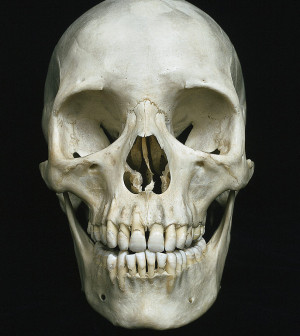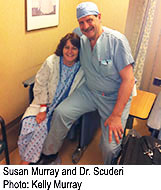- 8 Ways to Increase Dopamine Naturally
- 7 Best Breads for Maintaining Stable Blood Sugar
- Gelatin vs. Collagen: Which is Best for Skin, Nails, and Joints?
- The Long-Term Effects of Daily Turmeric Supplements on Liver Health
- Could Your Grocery Store Meat Be Causing Recurring UTIs?
- Are You Making This Expensive Thermostat Error This Winter?
- Recognizing the Signs of Hypothyroidism
- 10 Strategies to Overcome Insomnia
- Could Artificial Sweeteners Be Aging the Brain Faster?
- Techniques for Soothing Your Nervous System
Surgeons’ Group Gives Gift of New Hips, Knees to Uninsured


Millions of Americans struggle daily with degenerative, painful and crippling knee or hip arthritis, or similar chronic conditions that can turn the simplest task into an ordeal.
Fortunately, for those immobilized by their disease, hope exists in the form of knee or hip replacement, long considered the best shot at improving quality of life.
The hitch: a prohibitive price tag.
“Unfortunately, I’ve lost three jobs due to downsizing since 2006,” said 51-year old Susan Murray, a Freehold, N.J., resident. Murray has been combating a connective tissue disease that has progressively ravaged her knees. “And about six months ago I lost my health coverage,” she said. “I just could no longer afford to pay my bills and also keep up with my insurance payments.”
So despite an illness that leaves her cane-dependent and in constant pain, the single mother of three had no way to pay the $50,000 to $60,000 average out-of-pocket cost for both surgical and postsurgical care.
Enter Operation Walk USA (OWUSA).
According to OWUSA, the program was launched in 2011 as an annual nationwide effort to provide joint replacement surgery at zero cost for uninsured men and women for whom such expenses are out of reach.
The initiative is an outgrowth of the internationally focused Operation Walk, which since 1996 has provided free surgery to more than 6,000 patients around the world, according to an OWUSA news release. OWUSA initially solicited doctors and hospitals to volunteer their services one day each December to surgically intervene in the lives of American patients in need.
This year the effort has expanded greatly, as 120 orthopedic surgeons joined forces with 70 hospitals in 32 states to offer joint surgery to 230 patients spanning the course of a full week in December.
“With millions of people affected, we’re trying to reach out to those who are underserved,” said Dr. Giles Scuderi, an OWUSA organizer and orthopedic surgeon. The knee arthroplasty specialist currently serves as vice president of the orthopedic service line at North Shore LIJ Health System, an OWUSA participant based in the greater New York City region.
“Now by underserved we’re really talking about ‘population USA’,” he added. “That is, everyday people in our communities, our colleagues, our friends, people who lost their insurance for whatever reason. Maybe they had a job that they could no longer perform because of their illness, and so lost insurance, and couldn’t get it again because of a pre-existing condition. Maybe they could still get it but just can’t afford it.”
Another case is that of Joel Kent Matthews, a 50-year old farmer and truck driver in Smithville, Ark. After decades of sometimes excruciating hip pain from a head-on car collision at age 27, Matthews finally underwent total hip replacement surgery on Dec. 7. The cost: nothing, care of OWUSA and participating health providers at St. Vincent Infirmary in Little Rock.
Scuderi recalled another case.
“There’s a nurse’s aide in my area who had lost her job due to severe knee arthritis, and then had no insurance,” he said. “She qualified for the program last year, had the surgery, and now is actually employed again, by our hospital, as a nurse’s aide. So it’s a wonderful story that’s come full circle.”
“The point is that we, as orthopedic surgeons, recognize the kind of impact that degenerative hip and knee arthritis can have on a patient’s life, and how difficult it is for people who are living without health care coverage to deal with it and get their lives back,” Scuderi said. “So we want to get the message out that we care, and want to make a difference in their lives and well-being.”
That’s a message that Murray and her family have received.
“This has meant everything to me,” she said, one week after being discharged from Lennox Hill Hospital in New York City, where on Dec. 3 she underwent double-knee replacement surgery.
Murray described her oldest daughter’s efforts to alleviate her suffering. “She was very upset about what she was witnessing. My being in pain every day. Because I used to be very active. I used to ride my bike. I used to kayak. And at work, as an account manager and customer service rep, I used to deal with people all the time. I was very active and visible. So my daughter wanted me well again. She wanted me to dance at her wedding.”
Ultimately, friends of Murray reached out to OWUSA on behalf of the family. She was called in to meet with Scuderi, who offered her a chance at surgery on the spot.
“And all of them — the doctors on operating day, the nurses and physical therapists afterwards — the whole team took care of me soups to nuts,” said Murray, who now faces two to six months of recovery. “Everyone was wonderful and the generosity has been overwhelming. It’s almost like a miracle. Honestly, I couldn’t have asked for anything more life changing.”
More information
For more about joint replacement surgery, visit the U.S. National Institute of Arthritis and Musculoskeletal and Skin Diseases.
Source: HealthDay
Copyright © 2026 HealthDay. All rights reserved.










